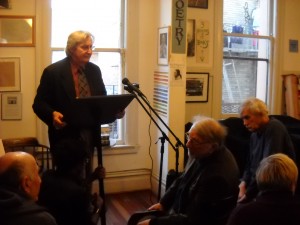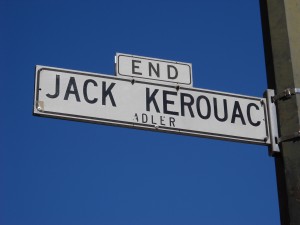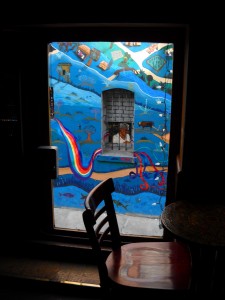
William Hjortsberg

Jack Kerouac Alley is adjacent to the City Lights Bookstore

The Vesuvius Cafe is mentioned in “jubilee hitchhiker.”
When William Hjortsberg started reading chapter twelve, “frisco,” from his new book “jubilee hitchhiker: the life and times of Richard Brautigan” (Counterpoint Berkeley hardback $42.50), and got to the lines about the role the City Lights bookstore played in the start of the Beat era in the city at the South end of the Golden Gate Bridge, it seemed rather appropriate to be hearing it with the audience in the poetry room of that very same bookstore.
In an era when perpetual growth, unlimited opportunity, and boundless optimism made it seem like America was driving a stake through the heart of poverty and that the starving artists of San Francisco were serving as artist proxies who would voluntarily submit themselves to the rigors of destitute living so that the middle class in the Eisenhower years would have some interesting and entertaining novels available to help amuse those who were enjoying the start of the era of infinite prosperity to know what life as a starving artist would be like rather than experiencing the American Dream firsthand.
The story of Richard Brautigan and a legion of others who would become the roster of celebrity artists who converged on San Francisco in the Fifties and Sixties has been fertile ground for almost all of the participants in the events that provided a gold rush opportunity for those luck enough to be there.
The World’s Laziest Journalist first heard Hjortsberg’s name when the mystery book sub-genre of vampire detectives became an obsession. Two decades ago, Hjortsberg’s books had become prized collectors’ items and so obtaining a copy of his “Falling Angel” became both a challenge and a necessity. Our quest led us to Vagabond books, back when they had a brick and mortar presence on Westwood Blvd., in Los Angeles. We asked if they had the book and they did. It was a mint condition copy. We balked at the price but mentioned how a New York Times review indicated that book was an outstanding example of the new sub-genre we were investigating. The clerk said: “Oh do you just want to read it?” We said yes and she scurried off and returned with a battered edition. It was just a “reader’s copy” and much less expensive.
That, in turn, led us to read several other Hjortsberg’s novels that were not about a vampire detective.
When we passed by the City Lights bookstore on Tuesday, March 20, and saw a flyer indicating that later in the week, Hjortsberg would be reading and signing his new book about Richard Brautigan. We decided that the event would be a twofer because we have also read some of Brautigan’s work.
Since our political punditry columns predicting that JEB will be the next President seems to upset both Liberals and Conservatives and since JEB endorsed Mitt Romney the next day, it seemed like the twofer reading and autograph party just might provide a timely and convenient opportunity to produce a column that veers away from partisan politics but still retains the right to be classified as news appropriate for use in the pop culture section.
The book was facetiously described as 50% a Brautigan biography, 50% a novel, and 50% Hjortsberg’s memoirs and that may sound like inaccurate mathematics until you see the gigantic book. The book could easily be described as an Encyclopedia of facts for fans of the Beat Generation.
The new book may revive the dormant debate about who precisely is and who is not a beatnik writer. Many of the authors mentioned in this new book are irrefutably classified as founding fathers of the Beat Generation. But some, like Brautigan, may not seem to qualify to be on the list.
One member of the audience at City Lights was a woman who was acting on behalf of her Brautigan fan husband who was out of town. One fellow came equipped with a large variety of Hjortsberg material to be signed by the author. He even had vintage copies of Playboy magazine with stories by Hjortsberg. The topic of writers’ autographs and getting books signed would provide enough material, such as the signed copies of the Philip K. Dick book that was published posthumously [signatures from his returned checks were pasted into numbered copies of the book], for an entire column.
Since Hjortsberg mentioned that James Crumley was among the vast array of writers that the author knew personally, we used that as an excuse to ask Hjortsberg during the Q and A segment of the evening a question that we had previously (at the Ocean Front Bookstore on the Venice Boardwalk) asked Crumley: “What is your favorite dive bar?” Hjortsberg responded by noting that his favorite bar in all the world did not qualify as a dive bar and that was the legendary McSorley’s Bar in New York City.
It turned out that Hjortsberg’s father owned a different bar in New York City. Later when Hjortsberg was signing copies of the new book, one member of the audience compared Brautigan unfavorably to Gene Sheppard and that caused Hjortsberg to elaborate on being influenced, as a kid, by the New York late night radio talk show hosted by Sheppard.
Luckily the massive book (Will it be compared to Boswell’s Life of Johnson? [It just was in the last sentence.]) has an Index and that will make it much easier for students of literature who want to read this new book as a source book for possible thesis material. Crumley’s name gets three pages listed and he appears in a caption in the selection of photos in the book. As best as we can recall, Crumley’s response to the question was a bar named “Mother’s” somewhere in Montana.
At this point, the fact that many of the beat writers used their own life experiences as the basis for their books, such as Brautigan did with “Willard and his bowling tropies,” caused this columnist to notice a distinct similarity to the “New Journalism” style of writing that emerged fifty years ago immediately following the Beat era. Where does the Beat style end and the New Journalism style begin? Will this new book provide fodder for a debate about that very topic?
Jack Kerouac wrote about one particular San Francisco poetry reading in 1955 in his book “The Dharma Bums.” Kerouac fictionalized the names of the participants in the actual poetry reading at the 6 Gallery. Kerouac also included some of the participants, Neal Cassady and Alan Ginsburg, with yet other fictionalized names, in his classic beat novel “On the Road.” Tom Wolfe, one of New Journalism’s founding fathers, wrote about the exploits of Neal Cassady in his work of nonfiction titled “The Electric Kool Aide Acid Test.”
When the line of those getting items autographed disappeared and we noticed that there was one copy of the new book left, we decided that it was time to start our Christmas gift shopping (Is this a manifestation of doubt concerning our claim that when JEB wins the November 2012 Presidential Election, we will do our Christmas shopping in Paris [France not Texas {should we put a visit to the town in Texas on our Bucket List?}]?) and buy the last copy and have it inscribed. (The recipient will never know we read it before giving it . . . unless they read this column and that’s not bloody well likely.)
Hjortsberg said that a great amount of material had been cut from the original manuscript to pare it down to the massive volume which was printed. During a period of skimming through the book, we encountered several topics which might warrant use as a subject for a full column in the near future, so we appreciated the challenge of the task of figuring out (as the song goes) “what to leave in and what to leave out.” If this new book becomes a runaway best seller, does that mean that sometime in the future Beatnik fans can clamor for a “director’s cut” edition which will be twice as big?
We noticed that many of the complaints of the poets and writers described in this new book sounded very familiar. That brought up a question for another potential column topic: Are the Occupy Protesters recycling the Beatnik’s criticism of “the Establishment”?
The Vesuvius Café, which is just across Jack Kerouac Alley from the City Lights bookstore, is mentioned in the book but not listed in the Index.
One of the passages Hjortsborg read described a Brautigan project that combined poems with plant seed packets “published” with the title “Plant this book.” Brautigan gave them away in the late Sixties and Hjortsborg said that ones in mint condidtion are now valued at a thousand dollars by collectors. This columnist lived in San Francisco in 1969, but we don’t know how valid our “oh yeah, I remember seeing that” memories are because this column’s closing quote is the current folk axiom: “If you can remember the Sixties; you weren’t really there.”
Now the disk jockey will play “The Age of Aquarius,” Country Joe’s “Fixin’ to die rag,” and “Big Bad Bruce” (that may have been a regional hit played only on San Francisco jukeboxes). We have to go and search for a way to exceed our life time best (in a letter to a high school classmate in Vietnam) of a quadruple end parentheses punctuation. Have a “solid!” type week.
Are 12 Senators better than 2?
An initiative that qualified to be on the ballot in California this fall will get little, if any, coverage in the national media which is operating on reduced staff status because of austerity budgets. In the era of the “smaller is better” philosophy becoming ubiquitous in the political arena conservatives will be obliged to ridicule the idea of dividing (like the loaves and fishes shtick) the California state government up into six groups. The conservatives will be quick to remind voters that mom and pop businesses will need to print new stationary if the change is approved and therefore the little guy can save a few bucks if he (and his wife since women got the vote) defeats this change which is bound t be labeled as just another nutty California idea.
California sends a large contingent of representatives to Congress along with two Senators. If the change is approved, there would be twelve Senators representing the same geographical area that now gets only two.
Isn’t California always depicted as a “stronghold” for the Democratic Party? Obviously if one of the new states included Orange County, they wouldn’t send Democrats to the Senate, but statistics for the whole of California tend to indicate that over the long haul, most of the new Senators would be Democrats thus urging small business owners to save a few bucks and staying with their old stationary would be an economically appealing way to let selfishness determine a difficult and complex issue.
On Wednesday, July 17, 2014, the San Francisco Chronicle, which was once owned by Presidential hopeful William Randolph Hearst, was featuring a story headlined “State of confusion over 6 Californias” on its front page.
Conservative media owners are not going to let the voters become convinced that California needs more Senators than Delaware or Rhode Island, so don’t waste any money betting on the measure passing.
Initially, Berkeley and Venice Beach may seem like identical twins separated at birth but don’t jump to any conclusions before you take a closer look. Political activists in the Venice Beach area are very concerned with the activities of the California Coastal Commission, the Los Angeles County Board of Supervisors, and the effect global warming will have on raising the tide line. Berkeley has other issues to concern political activists. The Coastal Commission is ignored in Berkeley as an irrelevant diversion. UCB students can vote for a politician who wants to be a Berkeley City Council representative. Decisions regarding the University have a large influence on local residents in Berkeley. Folks in the Venice Beach area let the schools (such as Pepperdine, UCLA, Santa Monica College, and USC) tend to their own business.
Sports fans in the San Francisco Bay area are very different from sports fans in Southern California.
Conservatives who believe less government is best, will want to maintain the status quo so that the huge state has only one government entity to worry about shorelines, forests, prisons, highways and the state parks.
People from outside the area (such as the ones that work on the staff at the New York Times) would do well to skim through Curt Gentry’s book, “The Late Great State of California,” and Jon Winokur’s collection of quotes about the vast and very diversified state (“The War between the State”) before they sit down to write (ex cathedra) an editorial telling California voters what to think on this complex issue.
Literature from California is as diverse as the people and geography. Many critics consider “Grapes of Wrath” to be the greatest novel written in America. Mystery novelist established a cottage industry genre based on a lone detective. Dashiell Hammett’s Sam Spade worked in San Francisco; Raymond Chandler’s Philip Marlowe worked in L. A. County.
A driver can leave San Diego head North and after a full day of driving still be in California. People who live at Lake Tahoe refer to going shopping as “go into the City.” It takes (if memory serves) about four hours to get from the casinos to the cable cars.
Music in Cali is also very diverse. The L. A. sound is best exemplified by the Doors and the San Francisco sound means “crank up the Jefferson Airplane.” What country music fan doesn’t think Bakersfield and Buck Owens are synonymous? Doesn’t Merle “Oakie from Muskogee” Haggard live somewhere in California? In Santa Monica an apartment house once owned by Lawrence Welk dominates the skyline.
Ansel Adams was born and raised in San Francisco.
Didn’t Clint Eastwood become mayor of Monterey? Didn’t Sonny Bono wind up as a Congressman from So Cal? Wasn’t Richard Nixon born and raised in Southern California? St. Ronald Reagan changed American politics starting with his manipulation of the protesters at Berkeley. They were a convenient foothold for his climb to the White House.
Innovation and growth are important when it comes to the people known as corporations, but as far as administering the services needed by the voters in California the conservatives will dust off the references to the wishes of the founding fathers and stress that a lot of expenses for new stationary can be avoided with a “No” vote in November.
If less is more, maybe political activists from California should urge the consolidation of Louisiana, Alabama, Mississippi, and Georgia into one state?
Dividing California could have dire repercussions. Are there ten local politicians in Delaware or Rhode Island who wouldn’t be glad to become a repetitive in the United States Senate? If a state is so small that it gets only one Congressional district doesn’t it make sense to divide it into six smaller states so that the same geographical area will suddenly have six people in Congress?
The media in New York can’t completely ignore this developing political story because the conservative media owners will want to stifle innovation at the git-go and sending a top notch reporter to cover the bowl of granola aspect of the story will be as good as giving them a big cash Christmas bonus.
People in flyover country (such as Concordia Kansas) love the jokes that make fun of California such as: Why is Los Angeles like a bowl of granola? (It’s all nuts, fruits, andf flakes!)
Since California would (most likely) fit into the Southwest corner of the W. A. (AKA Western Australia), it might be best to quash this break it into smaller pieces political trend right here and now before the voters in Kalgoorlie start to get some strange ideas from America.
[Note from the photo editor: we dug into the archives to find some photos from the Venice Beach area and some tourist type pictures from Frisco to illustrate the point that both areas are far apart physically and (upon closer inspection) politically too.]
William Hjortsberg has written: “The future remains an unwritten book, its cryptic pages blank, and no crystal ball wizard, palm reader or Tarot deck manipulator can accurately provide a sneak preview of what’s coming in the next chapter.”
The disk jockey will play the Doors “L. A. Woman,” the Jefferson Airplane’s “Plastic Fantastic Lover,” and the CCR (from “near” Berkeley) song, “Run Through the Jungle.” We have to go see where the Buffalo Springfield is playing this weekend. Have a “Point Break” type week.